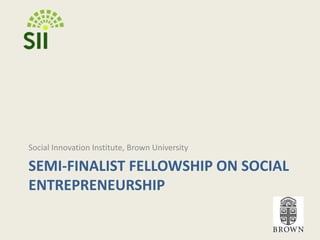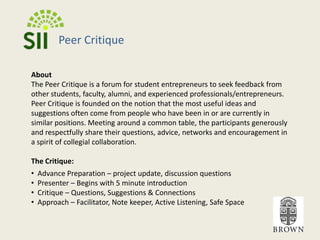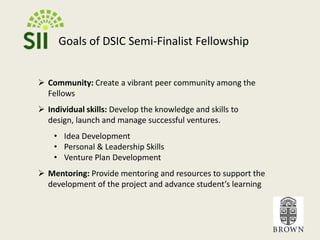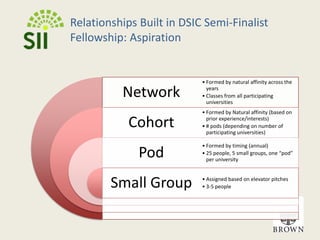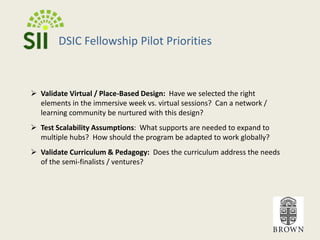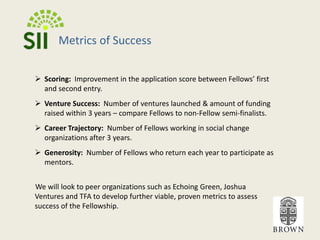DSIC Semi-Finalist Fellowship Overview
- 1. SEMI-FINALIST FELLOWSHIP ON SOCIAL ENTREPRENEURSHIPSocial Innovation Institute, Brown University
- 2. Guiding Principles and BeliefsCollaboration The magnitude of social challenges in communities require that we share ideas and support each othersŌĆÖ efforts. Generosity Social entrepreneurship is based on a culture of generosity. This principle is evident in the proliferation of open sourcing in the social and private sector.Peer Critique Peers are a rich source of expertise, insights, and connections that advance our work.Mentoring Students have the desire and passion to engage in social change work but need mentoring and resources to guide and support their efforts.
- 3. Guiding Principles and Beliefs (contŌĆÖd) Context Innovation requires deep knowledge & experience about the full context of existing social challenges including how existing solutions are/are not addressing them.Client Focused Communities possess deep, rich knowledge about the root causes of their challenges and are a rich source of innovative ideas.Strong Design Projects should be designed from the beginning with a clear sense of the impact on recipients and respect for community resources
- 4. Peer CritiqueAboutThe Peer Critique is a forum for student entrepreneurs to seek feedback from other students, faculty, alumni, and experienced professionals/entrepreneurs. Peer Critique is founded on the notion that the most useful ideas and suggestions often come from people who have been in or are currently in similar positions. Meeting around a common table, the participants generously and respectfully share their questions, advice, networks and encouragement in a spirit of collegial collaboration. The Critique: Advance Preparation ŌĆō project update, discussion questions
- 5. Presenter ŌĆō Begins with 5 minute introduction
- 6. Critique ŌĆō Questions, Suggestions & Connections
- 7. Approach ŌĆō Facilitator, Note keeper, Active Listening, Safe Space Dell Social Innovation Competition (DSIC)Rewards students with the most innovative ideas to solve a social or environmental problem anywhere in the world.The Process:Round 1: Idea ConceptsStudents post ideas onlineParticipating students vote and comment on ideasRound 2: Semi-Finals100 Semi-Finalists announced March 1Semi-Finalists paired with mentors to receive advice on their planSemi-Finalists submit detailed venture plan on April 1Round 3:Finals5 Finalists announced on April 1520 Semi-Finalists announced for DSIC-Semi-Finalist Fellowship Program at Brown UniversityFinalists flown to Austin, TX for Finalist Weekend, May 13-15 Awards are made on April 16.
- 8. Goals of DSIC Semi-Finalist FellowshipCommunity: Create a vibrant peer community among the Fellows
- 9. Individual skills: Develop the knowledge and skills to design, launch and manage successful ventures.
- 10. Idea Development
- 11. Personal & Leadership Skills
- 13. Mentoring: Provide mentoring and resources to support the development of the project and advance studentŌĆÖs learningRelationships Built in DSIC Semi-Finalist Fellowship: Aspiration
- 15. DSIC Fellowship - Pre-Field Plan
- 16. DSIC Fellowship Pilot PrioritiesValidate Virtual / Place-Based Design: Have we selected the right elements in the immersive week vs. virtual sessions? Can a network / learning community be nurtured with this design?
- 17. Test Scalability Assumptions: What supports are needed to expand to multiple hubs? How should the program be adapted to work globally?
- 18. Validate Curriculum & Pedagogy: Does the curriculum address the needs of the semi-finalists / ventures? Metrics of SuccessScoring: Improvement in the application score between FellowsŌĆÖ first and second entry.
- 19. Venture Success: Number of ventures launched & amount of funding raised within 3 years ŌĆō compare Fellows to non-Fellow semi-finalists.
- 20. Career Trajectory: Number of Fellows working in social change organizations after 3 years.
- 21. Generosity: Number of Fellows who return each year to participate as mentors.We will look to peer organizations such as Echoing Green, Joshua Ventures and TFA to develop further viable, proven metrics to assess success of the Fellowship.

